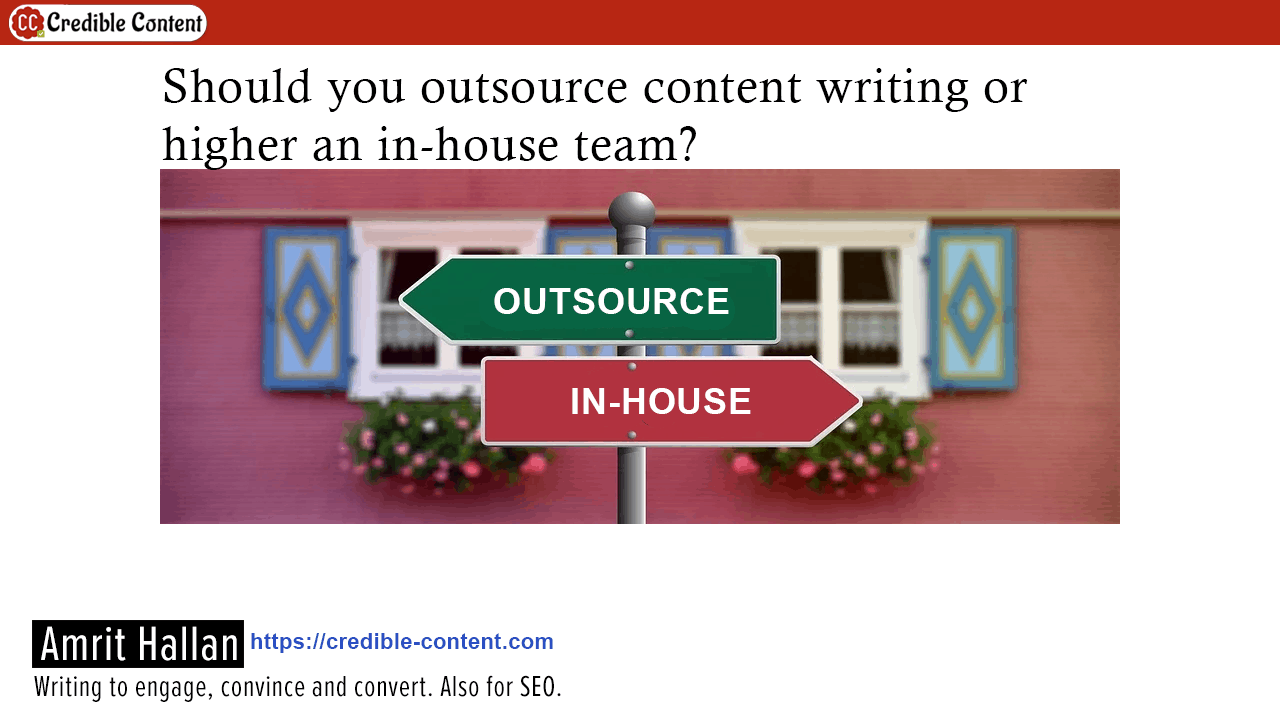
Publish better content than your competitors.
Publishing regular content is always about beating your competitors. This may not be your direct aim, but by the end of the day, it matters how much business you can wean away from your competitors, towards your own website or blog.
How can you build better content than your competitors? Here are a few things you can do
1. Understand your audience better
The more you understand your audience, the better your content will be. But what does understanding your audience mean?
It means writing and publishing exactly the content your visitors are looking for.
It means understanding the search intent and then writing content around that search intent.
You may like to read: Why search intent is most important when writing content for your website.
2. Use conversational writing
- Write in a manner that it is easy to read.
- Use small sentences.
- Use smaller paragraphs.
- Use bulleted lists whenever possible because they are easier to read.
- Organize your text under headings and subheadings for easier reading.
3. Publish lots of long form content
Although I’m not a big fan of needless long form content, not many publishers can come up with quality long form content.
Long form content means publishing well researched blog posts and articles. These can be anywhere between 2000-3000 words, and sometimes even more.
The thing is, everyone can write 400–800-word blog posts but it is very difficult to come up with lengthy and comprehensive blog posts. This is where you can gain an edge.
4. Offer more value than your competitors
Most of your competitors might be publishing purposeless content just to improve your search engine rankings.
This may be a good thing for you because you understand that the purpose of publishing content regularly isn’t about improving your search engine rankings but providing value to your visitors.
- Publish meaningful content.
- Provide information that is valuable to your visitors.
- Educate your visitors better than your competitors.
5. Maintain a schedule and be persistent
A big problem with most of the business blogs is that they are not regular. They post whenever it is convenient for whenever their budget allows.
Content publishing is a commitment. You can’t just offer content to your visitors whenever you feel like.
- You need to be persistent.
- You need to be regular.
- Have a clearly defined content publishing calendar.
Publishing content with a schedule makes search engine crawlers visit your website regularly and also encourages your human visitors to keep a tab on your website.
6. Work with a professional content writer
I’m not saying this because I provide professional content writing services; it actually helps to work with a professional content writer because well-written content always outperforms content that is written in a lousy manner.
Most of the websites don’t have professionally written content. Luckily for you, you understand the importance of high-quality content (that’s why you are reading this, right?). The advanced AI being used in search engines can differentiate between good content and bad content.
Badly written content also increases your bounce rate. Remember that the writing on your website represents your approach to your customers and clients. If you don’t have properly written content on your website, it means that you don’t respect your customers and clients.
7. Publish case studies on your website
Case studies explain to your visitors how you solve their problems once they decide to hire you or buy your product or service. The format of a typical case study by itself is quite helpful. Here is how:
- The title of the case study.
- A small profile of the company or the individual for whom you had offered your product or service.
- The problem the company or the individual was facing prior to using your product or service.
- The highlights and features of the product or service you are describing in this case study.
- How your product or service solved the problem of the company or the individual.
- How the company or the individual is doing right now after having implemented the solution that you offered.
You can see that there is a natural flow –
- There is a narrative that the reader can follow.
- You introduce the characters.
- You introduce the problem or the conflict.
- Then you offer the solution.
- In the end, you offer the “happily ever after” condition created by your solution.
8. Use storytelling through content writing
Just like case studies, stories can also help you weave a narrative around your product or service. People easily relate to a story. They feel emotionally connected with the problem and the solution being offered. They are more receptive towards your messaging.
9. Use concrete numbers when stating facts
Avoid using expressions like “hundreds of”, “many”, “a wide range of”, and so on.
Use numbers as much as possible. Instead of saying that “we have served hundreds of clients” say, “we have so far served 300+ clients”.
Instead of saying “our product offers many ways to solve your problem” say, “our product offers 18 ways to solve your problem”.
10. Master SEO content writing
SEO content writing can boost your search engine rankings. Writers who can get higher search engine rankings for their clients are highly coveted.
You may like to read this for more information on the topic: 10 SEO content writing rules you cannot ignore.
11. Publish content on multiple platforms
Content publishing these days isn’t just about publishing content on your website or on your business blog. You need to cover many platforms such as third-party blogs and social media websites.
- Share your content on LinkedIn.
- Post answers on Quora.
- Write on Medium.
- Offer guest blog posts on authoritative websites and blogs.
12. Re-purpose your existing content
You can re-purpose your existing content in many forms.
- You can recycle small portions and post them on social media websites.
- You can create dedicated blog posts on subtopics that you may have mentioned in other blog posts.
- You can create infographics.
- You can create animation and videos explaining the same concepts that you may have explained in a blog post.
13. Build a mailing list
This has got nothing to do with content writing or content publishing, but you can beat your competition by building a mailing list from scratch.
Of course, publishing a mailing list or a newsletter also involves content writing. Whenever you publish a new blog post you can broadcast the link to your newsletter. You can distribute important updates about your product or service using your mailing list. You can increase traffic to your website.
Ultimately it boils down to delivering value.
Fortunately for you, very few of your competitors publish content to serve their visitors well. In most of the cases, they want to generate search engine traffic and then they hope that this traffic would lead to business.
Unless they are publishing advertisements and that is the main source of revenue, random traffic does not help. You need to generate targeted traffic and targeted traffic can only be generated by publishing high-value targeted content.



